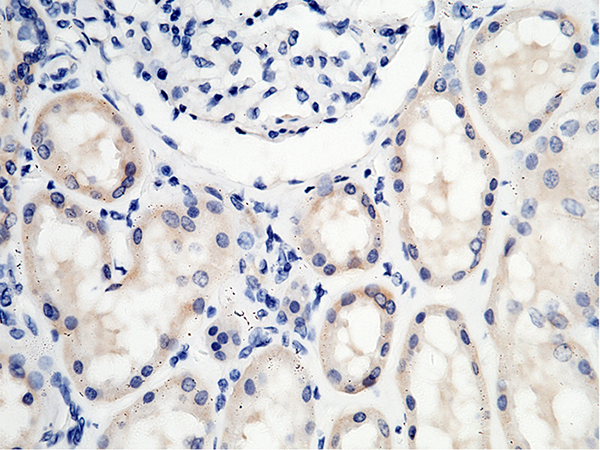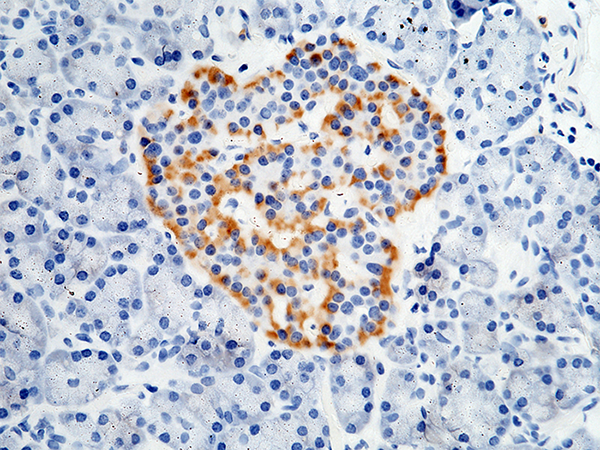-
Product Name
Anti-Insulin Receptor/CD220 antibody
- Documents
-
Description
Rabbit polyclonal to Insulin Receptor/CD220
-
Tested applications
ELISA, IHC-P
-
Species reactivity
Human Insulin Receptor / CD220 / INSR
-
Alternative names
HHF5 antibody; CD220 antibody; IR antibody; IR-A antibody; IR-B antibody; CD220 antibody; 4932439J01Rik antibody; D630014A15Rik antibody; 4932439J01Rik antibody; CD220 antibody; CD220 antibody; D630014A15Rik antibody; HHF5 antibody; Insr antibody; INSR antibody; IR antibody
- Immunogen
-
Isotype
Rabbit IgG
-
Preparation
Produced in rabbits immunized with purified, recombinant Human Insulin Receptor / CD220 / INSR (rh Insulin Receptor / CD220 / INSR; NP_000199.2; Met 1-Lys 956). Insulin Receptor / CD220 / INSR specific IgG was purified by Human Insulin Receptor / CD220 / INSR affinity chromatography.
-
Clonality
Polyclonal
-
Formulation
0.2 μm filtered solution in PBS with 5% trehalose
-
Storage instructions
This antibody can be stored at 2℃-8℃ for one month without detectable loss of activity. Antibody products are stable for twelve months from date of receipt when stored at -20℃ to -80℃. Preservative-Free.
Sodium azide is recommended to avoid contamination (final concentration 0.05%-0.1%). It is toxic to cells and should be disposed of properly. Avoid repeated freeze-thaw cycles. -
Applications
ELISA: 0.5-1 μg/mL
This antibody can be used at 0.5-1 μg/mL with the appropriate secondary reagents to detect Human INSR. The detection limit for Human INSR is approximately 0.00245 ng/well.
IHC-P: 1-3 μg/mL
-
Validations

Insulin Receptor / CD220 / INSR Antibody, Rabbit PAb, Antigen Affinity Purified, Immunohistochemistry
Immunochemical staining of human INSR in human kidney with rabbit polyclonal antibody (15µ g/mL, formalin-fixed paraffin embedded sections).

Insulin Receptor / CD220 / INSR Antibody, Rabbit PAb, Antigen Affinity Purified, Immunohistochemistry
Immunochemical staining of human INSR in human pancreas with rabbit polyclonal antibody (15 µg/mL, formalin-fixed paraffin embedded sections).
-
Background
INSR (Insulin receptor), also known as CD220, is a transmembrane receptor that is activated by insulin. INSR belongs to theprotein kinase superfamily, and exists as a tetramer consisting of two alpha subunits and two beta subunits linked by disulfide bonds. The alpha and beta subunits are encoded by a single INSR gene, and the beta subunits pass through the cellular membrane. As the receptor for insulin with tyrosine-protein kinase activity, INSR associates with downstream mediators upon binding to insulin, including IRS1 (insulin receptor substrate 1) and phosphatidylinositol 3'-kinase (PI3K). IRS-1 binding and phosphorylation eventually leads to an increase in the high affinity glucose transporter (Glut4) molecules on the outer membrane of insulin-responsive tissues. INSR isoform long and isoform short are expressed in the peripheral nerve, kidney, liver, striated muscle, fibroblasts and skin, and is found as a hybrid receptor with IGF1R which also binds IGF1 in muscle, heart, kidney, adipose tissue, skeletal muscle, hepatoma, fibrobasts, spleen and placenta. Defects in Insulin Receptor/INSR are the cause of Rabson-Mendenhall syndrome (Mendenhall syndrome), insulin resistance (Ins resistance), leprechaunism (Donohue syndrome), and familial hyperinsulinemic hypoglycemia 5 (HHF5). It may also be associated with noninsulin-dependent diabetes mellitus (NIDDM).
Related Products / Services
Please note: All products are "FOR RESEARCH USE ONLY AND ARE NOT INTENDED FOR DIAGNOSTIC OR THERAPEUTIC USE"
